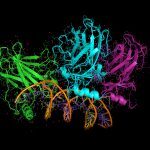Lien vers Pubmed [PMID] – 21764995
FASEB J. 2011 Nov;25(11):3790-802
Muscle atrophy prevails in numerous diseases (cancer cachexia, renal failure, infections, etc.), mainly results from elevated proteolysis, and is accelerated by bed rest. This largely contributes to increased health costs. Devising new strategies to prevent muscle wasting is a major clinical challenge. The ubiquitin proteasome system (UPS) degrades myofibrillar proteins, but the precise mechanisms responsible for actin breakdown are surprisingly poorly characterized. We report that chimeric flag-actin was destabilized and polyubiquitinylated in stably transfected C2C12 myotubes treated with the catabolic agent dexamethasone (1 μM) and that only proteasome inhibitors blocked its breakdown. Actin polyubiquitinylation was also detected in wild-type C2C12 myotubes and human muscle biopsies from control participants and patients with cancer. The muscle-specific E3 ubiquitin ligase MuRF1 is up-regulated in catabolic conditions and polyubiquitinylates components of the thick filament. We also demonstrate that recombinant GST-MuRF1 physically interacted and polyubiquitinylated actin in vitro and that MuRF1 is a critical component for actin breakdown, since MuRF1 siRNA stabilized flag-actin. These data identify unambiguously the abundant contractile protein actin as a target of the UPS in skeletal muscle both in vitro and in vivo, further supporting the need for new strategies blocking specifically the activation of this pathway in muscle wasting conditions.



